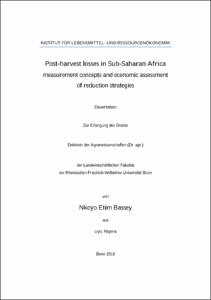Bassey, Nkoyo Etim: Post-harvest losses in Sub-Saharan Africa : measurement concepts and economic assessment of reduction strategies. - Bonn, 2018. - Dissertation, Rheinische Friedrich-Wilhelms-Universität Bonn.
Online-Ausgabe in bonndoc: https://nbn-resolving.org/urn:nbn:de:hbz:5n-52804
Online-Ausgabe in bonndoc: https://nbn-resolving.org/urn:nbn:de:hbz:5n-52804
@phdthesis{handle:20.500.11811/7384,
urn: https://nbn-resolving.org/urn:nbn:de:hbz:5n-52804,
author = {{Nkoyo Etim Bassey}},
title = {Post-harvest losses in Sub-Saharan Africa : measurement concepts and economic assessment of reduction strategies},
school = {Rheinische Friedrich-Wilhelms-Universität Bonn},
year = 2018,
month = nov,
note = {Post-harvest loss (PHL) is a major source of inefficiency in the agricultural value chain in Sub-Saharan Africa (SSA). It wastes productive resources, reduces economic agents' income, and aggravates the problem of insufficient consumption of adequate, nutritious and safe food. Addressing the problem of PHL therefore has to be an important part of any strategic approach for improving food security in the region. As a first step, the extent and nature of the problem has to be more precisely investigated, as differences in available estimates of PHL vary widely. On the policy level, interventions have traditionally focused on the adoption of technical solutions by farmers, which is primarily suited to address the quantitative loss aspect. However, to reduce the equally common losses through reduced quality, it is also relevant to understand to what extent buyers are willing to compensate farmers for the costs involved with adopting new technologies to supply crops of superior quality.
The objective of this thesis is to assess strategies for reducing PHL in SSA focusing on (i) measurement concepts of losses and the implication for reliable estimates (ii) analyzing the determinants, extent and economic benefits of technology use in PHL reduction and (iii) assessing marketers' (intermediary buyers) aversion to loss. The approaches applied in achieving the objective of this thesis involve a detailed methodological review of studies providing post-harvest loss estimates; empirical analysis of the use, determinants and economic benefits of advanced technology use in PHL reduction; and empirical assessment of marketers' aversion to loss. Each empirical analysis uses both descriptive and regression frameworks based on data from farmers and marketers obtained in 2015. The result on measurement approaches shows that problems associated with obtaining consistent PHL estimates for SSA include, insufficient micro-level assessments, different estimation methods, and varying temporal and spatial extrapolations applied in the estimation process. Results for the use of advanced PHL reduction technologies show that incentives are inadequate and that buyer power is crucial in the decision to use these technologies. The assessment of aversion to loss shows that marketers' aversion is more evident where grades and standards are clearly defined. The findings highlight the need for updated micro-level studies in order to obtain reliable and consistent estimates for the region, while addressing the institutional development of markets to make PHL reduction efforts profitable for economic agents in SSA.},
url = {https://hdl.handle.net/20.500.11811/7384}
}
urn: https://nbn-resolving.org/urn:nbn:de:hbz:5n-52804,
author = {{Nkoyo Etim Bassey}},
title = {Post-harvest losses in Sub-Saharan Africa : measurement concepts and economic assessment of reduction strategies},
school = {Rheinische Friedrich-Wilhelms-Universität Bonn},
year = 2018,
month = nov,
note = {Post-harvest loss (PHL) is a major source of inefficiency in the agricultural value chain in Sub-Saharan Africa (SSA). It wastes productive resources, reduces economic agents' income, and aggravates the problem of insufficient consumption of adequate, nutritious and safe food. Addressing the problem of PHL therefore has to be an important part of any strategic approach for improving food security in the region. As a first step, the extent and nature of the problem has to be more precisely investigated, as differences in available estimates of PHL vary widely. On the policy level, interventions have traditionally focused on the adoption of technical solutions by farmers, which is primarily suited to address the quantitative loss aspect. However, to reduce the equally common losses through reduced quality, it is also relevant to understand to what extent buyers are willing to compensate farmers for the costs involved with adopting new technologies to supply crops of superior quality.
The objective of this thesis is to assess strategies for reducing PHL in SSA focusing on (i) measurement concepts of losses and the implication for reliable estimates (ii) analyzing the determinants, extent and economic benefits of technology use in PHL reduction and (iii) assessing marketers' (intermediary buyers) aversion to loss. The approaches applied in achieving the objective of this thesis involve a detailed methodological review of studies providing post-harvest loss estimates; empirical analysis of the use, determinants and economic benefits of advanced technology use in PHL reduction; and empirical assessment of marketers' aversion to loss. Each empirical analysis uses both descriptive and regression frameworks based on data from farmers and marketers obtained in 2015. The result on measurement approaches shows that problems associated with obtaining consistent PHL estimates for SSA include, insufficient micro-level assessments, different estimation methods, and varying temporal and spatial extrapolations applied in the estimation process. Results for the use of advanced PHL reduction technologies show that incentives are inadequate and that buyer power is crucial in the decision to use these technologies. The assessment of aversion to loss shows that marketers' aversion is more evident where grades and standards are clearly defined. The findings highlight the need for updated micro-level studies in order to obtain reliable and consistent estimates for the region, while addressing the institutional development of markets to make PHL reduction efforts profitable for economic agents in SSA.},
url = {https://hdl.handle.net/20.500.11811/7384}
}






